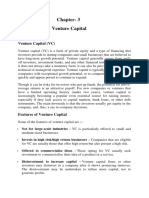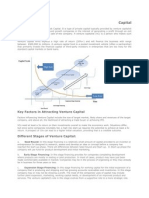Services/Functions of Merchant Banking (I) Corporate Counseling: Corporate Counseling Covers Counseling in The Form of
Services/Functions of Merchant Banking (I) Corporate Counseling: Corporate Counseling Covers Counseling in The Form of
Uploaded by
TejalCopyright:
Available Formats
Services/Functions of Merchant Banking (I) Corporate Counseling: Corporate Counseling Covers Counseling in The Form of
Services/Functions of Merchant Banking (I) Corporate Counseling: Corporate Counseling Covers Counseling in The Form of
Uploaded by
TejalOriginal Description:
Original Title
Copyright
Available Formats
Share this document
Did you find this document useful?
Is this content inappropriate?
Copyright:
Available Formats
Services/Functions of Merchant Banking (I) Corporate Counseling: Corporate Counseling Covers Counseling in The Form of
Services/Functions of Merchant Banking (I) Corporate Counseling: Corporate Counseling Covers Counseling in The Form of
Uploaded by
TejalCopyright:
Available Formats
Services/Functions of Merchant banking
(i) Corporate counseling: Corporate counseling covers counseling in the form of
project counseling, capital restructuring, project management, public issue
management, loan syndication, working capital fixed deposit, lease financing,
acceptance credit etc., The scope of corporate counseling is limited to giving
suggestions and opinions to the client and help taking actions to solve their problems.
It is provided to a corporate unit with a view to ensure better performance, maintain
steady growth and create better image among investors.
(ii) Project counseling Project counseling is a part of corporate counseling and
relates to project finance. It broadly covers the study of the project, offering advisory
assistance on the viability and procedural steps for its implementation.
a. Identification of potential investment avenues.
b. A general view of the project ideas or project profiles.
c. Advising on procedural aspects of project implementation d. Reviewing the
technical feasibility of the project
e. Assisting in the(TechnicalselectionConsultancyOrganizations)of
forTCOspreparing project reports
f. Assisting in the preparation of project report
g. Assisting in obtaining approvals, licenses, grants, foreign collaboration etc., from
government
h. Capital structuring
i. Arranging and negotiating foreign collaborations, amalgamations, mergers and
takeovers.
j. Assisting clients in preparing applications for financial assistance to various
national and state level institutions banks etc.,
k. Providing assistance to entrepreneurs coming to India in seeking approvals from
the Government of India.
(iii) Capital Structure Here the Capital Structure is worked out i.e., the capital
required, raising of the capital, debt-equity ratio, issue of shares and debentures,
working capital, fixed capital requirements, etc.,
(iv) Portfolio Management It refers to the effective management of Securities
i.e., the merchant banker helps the investor in matters pertaining to investment
decisions. Taxation and inflation are taken into account while advising on
investment in different securities. The merchant banker also undertakes the function
of buying and selling of securities on behalf of their client companies. Investments
are done in such a way that it ensures maximum returns and minimum risks.
(v) Issue Management: Management of issues refers to effective marketing of
corporate securities viz., equity shares, preference shares and debentures or bonds
by offering them to public. Merchant banks act as intermediary whose main job is
to transfer capital from those who own it to those who need it. The issue function
may be broadly divided in to pre issue and post issue management.
a. Issue through prospectus, offer for sale and private placement. b. Marketing and
underwriting
c. pricing of issues
(vi) Credit Syndication: Credit Syndication refers to obtaining of loans from
single development finance institution or a syndicate or consortium. Merchant
Banks help corporate clients to raise syndicated loans from commercials banks.
Merchant banks helps in identifying which financial institution should be
approached for term loans. The merchant bankers follow certain steps before
assisting the clients approach the appropriate financial institutions. a.
Merchant banker first makes an appraisal of the project to satisfy that it is viable b.
He ensures that the project adheres to the guidelines for financing industrial projects.
c. It helps in designing capital structure, determining the promoters amount of term
loan to be raised. d. After verifications of the project, the Merchant Banker arranges
for a preliminary meeting with financial institution. e. If the financial institution
agrees to consider the proposal, the application is filled and submitted along with
other documents.
offshore fincance
The merchant bankers help their clients in the following areas involving foreign
currency
Long term foreign currency loans
Joint ventures abroad
Financing exports and imports
Foreign collaboration arrangements
Non-resident investment
The services of merchcant banker includes investment advisory services to NRI in
terms of identification of investment opportunities, selection of securities,
investment management, and operational services like purchase and sale of
securities
(vii) Working Capital: The Companies are given Working Capital finance,
depending upon their earning capacities in relation to the interest rate prevailing in
the market.
(viii)Venture Capital: Venture Capital is a kind of capital requirement which
carries more risks and hence only few institutions come forward to finance. The
merchant banker looks in to the technical competency of the entrepreneur for venture
capital finance.
(ix). Fixed Deposit: Merchant bankers assist the companies to raise finance by way
of fixed deposits from the public. However such companies should fulfill credit
rating requirements.
Stock Underwriting
This is one of the most common functions of a merchant bank. When owners of a large
company want to raise capital through investors on the stock market, they can acquire
the services of a merchant bank to take care of the job. The bank will determine the
amount of stocks that are to be issued as well as their price, and when to issue the new
stock. The merchant bank will file all of the necessary paperwork with the proper market
division and may also market the stock. If theres a large stock offering, a few merchant
banks might work on the project together. However, one of the banks will typically act as
the head underwriter on the job.
(x)Other Functions
Treasury Management- Management of short term fund requirements by client
companies.
Stock broking- helping the investors through a network of service units
Servicing of issues- servicing the shareholders and debenture holders in
distributing dividends, debenture interest.
Small Scale industry counseling- counseling SSI units on marketing and finance
Equity research and investment counseling merchant banker plays an important
role in providing equity research and investment counseling because the investor is
not in a position to take appropriate investment decision.
Assistance to NRI investors - the NRI investors are brought to the notice of the
various investment opportunities in the country.
Foreign Collaboration: Foreign collaboration arrangements are made by the
Merchant bankers.
Guidelines for Venture Capital
4.4 Regulatory Framework for VC in India
The following are the guidelines issued by the Government of India.
1. The public sector financial institutions, State Bank of India, scheduled banks, foreign banks
and their subsidiaries are eligible for setting the venture capital funds with a minimum size
of Rs.10 crore and a debt equity ratio of 1:15 they desire to raise funds from the public,
promoters will be required to contribute a minimum of 40 percent of capital. Foreign equity
upto 25 percent subject to certain conditions would be permitted.
The guideline provided for Non-Resident Indians investment upto 74 percent on a
reportorial basis and 25 percent to 40 percent on non repatriable basis. It should invest 60
percent of its funds in venture capital activity. The balance amount can be invested in new
issue of any existing or new company in equity, cumulative convertible performance
shares, debenture bonds or any other security approved by controller of Capital issues.
2. The venture capital companies and venture capital funds can be set up as joint venture
between stipulated agencies and non institutional promoters but the equity holding of such
programmes should not exceed 20 percent and should not be largest single holder.
3. The venture capital assistance should go to enterprises with a total investment of not more
than Rs. 10 crore.
4. The venture capital company (VCC) /Venture Capital Fund (VCF) should be managed by
professionals and should be independent of the parent organization.
5. The VCC/VCF will not be allowed to undertake activities such trading, brooking money
market, bills discounting, inter corporate lending. They will be allowed to invest in leasing
to the extent 15 percent of the total funds development. The investment on revival of risk
units will be treated as a part of venture capital activity.
6. Listing of VCCs/VCF can be according to the prescribed norms and underwriting of issues
at the promoter's discretion.
7. A person holding a position of full time chairman/president, chief executive, managing
director or executive director/whole time director in a company will not be allowed to hold
the same position simultaneously in the VCC/VCF.
8. The venture Capital assistance should be extended to
The enterprise having investment upto Rs. 10 crores in the project.
The technology involved should be new and untried or it should incorporate
significant improvement over the existing technology in India.,
The promoters should be new, professional or technically qualified with inadequate
resources.
The enterprise should be established in the company form employing professionally
qualified person for maintenance accounts.
9. Share practicing at the time of disinvestments by a public issue or general sale offer by the
company or fund may be done subject to this being calculated an objective criteria and the
basis disclosed adequately to the public.
Methods of Venture Financing In India
EQUITY
CONDITIONAL LOAN
CONVENTIONAL LOAN
INCOME NOTE
DEBENTURES
1.EQUITY
All Venture Capital Firms(VCF) provide equity.Their contribution may not exceed 49% of
the total equity capital.The effective control and majority ownership of the firm may remain
with the entrepreneur.The Venture capitalist becomes entitled to a share in the firms profits
as much as he is liable for the losses.The advantage to the VCF is that it can share in the
high value of the venture and make capital gains if the venture succeeds.
2.CONDITIONAL LOAN
This is a form of loan finance without any pre-determined repayment schedule or interest rate.A
conditional loan is repayable in the form of a royalty after the venture is able to generate sales.
No interest is paid on such loans.In India , VCFs charge royalty ranging from 2% to 15% ,the
actual rate depends on factors of the venture such as gestation period, cost-flow patterns, risk
involved.Some VCFs give a choice to the enterprise of paying a high rate of interest(above 20%)
instead of royalty on sales once it becomes commercially sound.Some funds recover only half of
the loan if the venture fails.
3. CONVENTIONAL LOAN
Conventional loans carry lower interest initially which increases after commercial production
commences.A small royalty is additionally charged to cover the interest foregone during the
initial years.The repayment of the principal is based on a pre-stipulated schedule, Venture
Capital Institutions usually do not insist upon mortgage/other security.
4.INCOME NOTE
Income notes are instruments which carry a uniform low rate of interest plus a royalty on
sales.
It combines the features of both conventional and conditional loan.
The principle is repaid according to a stipulated schedule.
5.Debentures
NON-CONVERTIBLE DEBENTURES
These carry a fixed rate of interest. Redeemable at par/premium.
Secured and can be cumulative or non-cumulative.
PARTLY CONVERTIBLE DEBENTURES
A convertible portion converted into equity shares at par/premium.
A non-convertible portion earns interest till redemption.
COUPON BONDS/DEBENTURES
These can be either convertible or non-convertible with zero/no interest rate.
SECURED PREMIUM NOTES
These are secured, redeemable at premium in lumpsome/instalments, have zero interest
and carry a warrant against which equity shares can be acquired.
Components of Financial System
A financial system refers to a system which enables the transfer of money
between investors and borrowers. A financial system could be defined at an
international, regional or organization level. The term system in Financial
System indicates a group of complex and closely linked institutions, agents,
procedures, markets, transactions, claims and liabilities within a economy.
Five Basic Components of Financial System
Financial Institutions
Financial Markets
Financial Instruments (Assets or Securities)
Financial Services
Money
Financial Institutions
Financial institutions facilitate smooth working of the financial system by making
investors and borrowers meet. They mobilize the savings of investors either
directly or indirectly via financial markets, by making use of different financial
instruments as well as in the process using the services of numerous financial
services providers.
They could be categorized into Regulatory, Intermediaries, Non-intermediaries
and Others. They offer services to organizations looking for advises on different
problems including restructuring to diversification strategies. They offer complete
array of services to the organizations who want to raise funds from the markets
and take care of financial assets for example deposits, securities, loans, etc.
Figure 1: Five Basic Components of Financial System
Financial Markets
A financial market is the place where financial assets are created or transferred. It
can be broadly categorized into money markets and capital markets. Money
market handles short-term financial assets (less than a year) whereas capital
markets take care of those financial assets that have maturity period of more than
a year. The key functions are:
1. Assist in creation and allocation of credit and liquidity.
2. Serve as intermediaries for mobilization of savings.
3. Help achieve balanced economic growth.
4. Offer financial convenience.
One more classification is possible: primary markets and secondary markets.
Primary markets handles new issue of securities in contrast secondary markets
take care of securities that are presently available in the stock market.
Financial markets catch the attention of investors and make it possible for
companies to finance their operations and attain growth. Money markets make it
possible for businesses to gain access to funds on a short term basis, while capital
markets allow businesses to gain long-term funding to aid expansion. Without
financial markets, borrowers would have problems finding lenders. Intermediaries
like banks assist in this procedure. Banks take deposits from investors and lend
money from this pool of deposited money to people who need loan. Banks
commonly provide money in the form of loans.
Financial Instruments
This is an important component of financial system. The products which are traded
in a financial market are financial assets, securities or other type of financial
instruments. There is a wide range of securities in the markets since the needs of
investors and credit seekers are different. They indicate a claim on the settlement
of principal down the road or payment of a regular amount by means of interest or
dividend. Equity shares, debentures, bonds, etc are some examples.
Financial Services
Financial services consist of services provided by Asset Management and Liability
Management Companies. They help to get the necessary funds and also make
sure that they are efficiently deployed. They assist to determine the financing
combination and extend their professional services upto the stage of servicing of
lenders. They help with borrowing, selling and purchasing securities, lending and
investing, making and allowing payments and settlements and taking care of risk
exposures in financial markets. These range from the leasing companies, mutual
fund houses, merchant bankers, portfolio managers, bill discounting and
acceptance houses.
The financial services sector offers a number of professional services like credit
rating, venture capital financing, mutual funds, merchant banking, depository
services, book building, etc. Financial institutions and financial markets help in the
working of the financial system by means of financial instruments. To be able to
carry out the jobs given, they need several services of financial nature. Therefore,
Financial services are considered as the 4th major component of the financial
system.
Money
Money is understood to be anything that is accepted for payment of products and
services or for the repayment of debt. It is a medium of exchange and acts as a
store of value.
Guidelines for merchant banking :
A merchant banker will require authorization by SEBI to carry out the business.
SEBI has classified the merchant bankers into four categories based on the nature and
range of the activities and the responsibilities.
Category I: It consists of merchant bankers who carry on the business of issue
management which consists of preparation of issue management which consists of
preparation of prospectus, determining the financial structure, tie-up of the financiers
and final allotment/refund of subscription and to act in the capacity of managers,
advisors or consultants to an issue, portfolio manager and underwriter.
Minimum networth required is Rs. 1 crore.
Category II: It consists of those authorized to act in the capacity of co-manger/advisor,
consultant underwriter to an issue.
The Minimum networth required is Rs. 50 Lakhs.
Category III: It consists of those authorized to act as underwriter, advisor or consultant
to an issue.
The Minimum networth required is Rs. 20 Lakhs.
Category IV: It consists of Merchant Banker who act as advisor or consultant to an
issue.
There is no Minimum networth required.
Every merchant banker should maintain copies of balance sheet,Profit and loss
account,statement of financial position
Half-yearly unaudited result should be submitted to SEBI
SEBI has been vested with the power to suspend or cancel the authorization in case of
violation of the guidelines
Every merchant banker shall appoint a Compliance Officer to monitor compliance of
the Act
SEBI has the right to send inspecting authority to inspect books of accounts,records
etc of merchant bankers
Inspections will be conducted by SEBI to ensure that provisions of the regulations are
properly complied.
An initial authorization fee,an annual fee and renewal fee may be collected by SEBI.
A lead manager holding a certificate under category I shall accept a minimum
underwriting obligation of 5% of size of issue or Rs.25 lakhs whichever is less
Mechanism/Procedure of Forfeiting
Forfaiting is a mechanism of financing exports:
a. By discounting export receivables.
b. Evidenced by bills of exchange or promissory notes.
c. Without recourse to the seller (such as the exporter).
d. Carrying medium to long-term maturities.
e. On a fixed rate basis (discount).
f. Up to 100% of the contract value.
In a forfaiting transaction, the exporter surrenders his rights to claim for payment on
goods delivered to an importer, in return for immediate cash payment from a forfaiting
Agency. As a result, an exporter can convert a credit sale into a cash sale, with no
recourse either to him or his banker.
Process details:
1. Exporter initiates negotiations with prospective overseas buyer, finalizes the contract
and the importer opens an LC through his Bank in favor of the seller (exporter).
2. Exporter Ships the goods as per the schedule agreed with the buyer.
3. The exporter draws a series of bills of exchange and sends them along with the
shipping documents, to his banker for presentation to importer for acceptance through
latters bank. Bank returns avalised and accepted bills of exchange to his client (the
exporter).
4. Exporter informs the Importers Bank about assignment of proceeds of transaction to
the Forfaiting bank.
5. Exporter endorses avalised Bill of Exchange (BOE) with the words Without recourse
and forwards them to the Forfaiting Agency (FA) through his bank.
6. The FA effects payments of discounted value after verifying the Avals signature and
other particulars.
7. Exporters Bank credits Exporters a/c.
8. On maturity of BOE/Promissory notes, the Forfaiting Agency presents the
instruments to the Aval (Importers Bank) for payment.
You might also like
- White Star Capital South East Asia Venture Capital Landscape 2020Document87 pagesWhite Star Capital South East Asia Venture Capital Landscape 2020White Star Capital100% (6)
- Venture Capital FinancingDocument41 pagesVenture Capital FinancingRíshãbh JåíñNo ratings yet
- CH 10 Venture Capital Financing (M.Y.Khan)Document18 pagesCH 10 Venture Capital Financing (M.Y.Khan)Gowtham Reloaded DNo ratings yet
- Cruise v. Guillory ComplaintDocument10 pagesCruise v. Guillory ComplaintSam Altman100% (2)
- Medical Devices Industry in IndiaDocument39 pagesMedical Devices Industry in IndiaAnurag Rawat100% (2)
- The Faith-Based EntrepreneurshipDocument106 pagesThe Faith-Based EntrepreneurshipQAMAR ABBAS100% (2)
- Venture Capital MeaningDocument5 pagesVenture Capital MeaningrhythmkannanNo ratings yet
- Unit 2 Mutual FundsDocument4 pagesUnit 2 Mutual FundsfaizalqureshiNo ratings yet
- Venture CapitalDocument32 pagesVenture CapitalVarnika BajajNo ratings yet
- Business AuthorityDocument36 pagesBusiness AuthorityAkashik GgNo ratings yet
- Venture CapitalDocument4 pagesVenture CapitalVinayNo ratings yet
- Venture Capital FinancingDocument19 pagesVenture Capital Financingapi-3774614100% (1)
- Ib 2Document34 pagesIb 2ptselvakumarNo ratings yet
- IFM Module 5Document35 pagesIFM Module 5sangam.jadhavNo ratings yet
- Venture Capital FinanceDocument7 pagesVenture Capital FinanceSachi LunechiyaNo ratings yet
- Lovishbajaj 97Document80 pagesLovishbajaj 97Mohan KumarNo ratings yet
- Services Provided by Merchant BanksDocument4 pagesServices Provided by Merchant BanksParul PrasadNo ratings yet
- C C I C C! " C # $ C # C$ C # C %$ C # $ & & ' (# +& & $ % (,-& " ./ & ! 0 1/ 2# 3 & '4 " "&$" +"5 !Document62 pagesC C I C C! " C # $ C # C$ C # C %$ C # $ & & ' (# +& & $ % (,-& " ./ & ! 0 1/ 2# 3 & '4 " "&$" +"5 !Joheb ZamanNo ratings yet
- Project Finance Smart TaskDocument5 pagesProject Finance Smart TaskYASHASVI SHARMANo ratings yet
- Financial ServicesDocument4 pagesFinancial ServicesadhuNo ratings yet
- UNIT 38 notesDocument17 pagesUNIT 38 notesmohankumar7490No ratings yet
- Merchant Banking I M ComDocument18 pagesMerchant Banking I M Comselvam sNo ratings yet
- Ibfs NotesDocument17 pagesIbfs NotesShweta JoshiNo ratings yet
- 1.Q: Explain The Functions of Merchant Banking. FunctionsDocument56 pages1.Q: Explain The Functions of Merchant Banking. FunctionsmayurgadaNo ratings yet
- Merchant BankingDocument4 pagesMerchant BankingSUNIL DUGANWANo ratings yet
- Features of Venture Capital: The Main Attributes of Venture Capital Can Be SummarizedDocument26 pagesFeatures of Venture Capital: The Main Attributes of Venture Capital Can Be SummarizedsushmaNo ratings yet
- Chapter 23Document4 pagesChapter 23Mukul KadyanNo ratings yet
- Chapter-5 Merchant: BankingDocument29 pagesChapter-5 Merchant: BankingaswinecebeNo ratings yet
- 1.Q: Explain The Functions of Merchant Banking. FunctionsDocument78 pages1.Q: Explain The Functions of Merchant Banking. FunctionsdrchitramohanNo ratings yet
- Financial Services NotesDocument16 pagesFinancial Services NotesNupur ChaturvediNo ratings yet
- Venture CapitalDocument6 pagesVenture CapitalBharath Gowda VNo ratings yet
- HC 4.3: Financial Services Venture Capital: Module - 3Document15 pagesHC 4.3: Financial Services Venture Capital: Module - 3AishuNo ratings yet
- UNIT-4: Financial Inst ItutionsDocument35 pagesUNIT-4: Financial Inst ItutionskaushalvrindaNo ratings yet
- Venture Capital Industry in BangladeshDocument8 pagesVenture Capital Industry in BangladeshUzzal AhmedNo ratings yet
- Major Difference Between Merchant Banking and Investment BankingDocument9 pagesMajor Difference Between Merchant Banking and Investment BankingHoney RoyNo ratings yet
- 172 16ccccm15-16cccbm15-16cccac15 2020052001362231Document8 pages172 16ccccm15-16cccbm15-16cccac15 2020052001362231elizabeth.partnershipNo ratings yet
- Sources of Capital, Informal Risk Capital & Venture CapitalDocument29 pagesSources of Capital, Informal Risk Capital & Venture CapitalDivyesh Gandhi0% (1)
- Unit 10 MRECHANT BANKINGDocument33 pagesUnit 10 MRECHANT BANKINGGinu George VargheseNo ratings yet
- Module 2 (Autosaved)Document61 pagesModule 2 (Autosaved)RinkaNo ratings yet
- VENTURECAPITAL2018Document4 pagesVENTURECAPITAL2018Akash PatilNo ratings yet
- Merchant BankingDocument6 pagesMerchant BankingVivek TathodNo ratings yet
- Issue Management and UnderwritingDocument11 pagesIssue Management and Underwritingrthi04No ratings yet
- Venture Capital FinancingDocument19 pagesVenture Capital FinancingRaghav GuptaNo ratings yet
- Principal of Finance PresentationDocument138 pagesPrincipal of Finance PresentationVikas PabaleNo ratings yet
- Module 7 - ED - 14MBA26Document15 pagesModule 7 - ED - 14MBA26Uday GowdaNo ratings yet
- Unit - II: Merchant BankingDocument39 pagesUnit - II: Merchant BankingashishNo ratings yet
- Merchant Banking: DefinitionDocument52 pagesMerchant Banking: DefinitionPranav D. PotekarNo ratings yet
- Credit and FInanceDocument60 pagesCredit and FInanceKrishna KumarNo ratings yet
- Venture CapitalDocument27 pagesVenture CapitalVkiran GowdaNo ratings yet
- Financial Services 1Document42 pagesFinancial Services 1Uma NNo ratings yet
- Venture Capital FinancingDocument17 pagesVenture Capital FinancingHemant DeshmukhNo ratings yet
- Venture Capital ProcessDocument9 pagesVenture Capital ProcessshaikameermalikNo ratings yet
- Unit 11 Corporate Advisory Services: ObjectivesDocument14 pagesUnit 11 Corporate Advisory Services: ObjectivesamitprgmrNo ratings yet
- Summer Internship Report.................. Docx132Document37 pagesSummer Internship Report.................. Docx132Rashmin TomarNo ratings yet
- Key Factors in Attracting Venture CapitalDocument4 pagesKey Factors in Attracting Venture CapitalPadmavathi HanmanthraoNo ratings yet
- PNB Capital ServicesDocument19 pagesPNB Capital ServicesRahul RajagopalanNo ratings yet
- Venture CapitalDocument30 pagesVenture Capitalmeenakshi383No ratings yet
- Primary Market Mod 1Document10 pagesPrimary Market Mod 1Ayush JaiswalNo ratings yet
- Report On "Bootstrap Finance": Submitted ToDocument18 pagesReport On "Bootstrap Finance": Submitted ToShraddha DekhaneNo ratings yet
- EMBA Launch Your Startup (Kaplan, McGourty) S2023Document9 pagesEMBA Launch Your Startup (Kaplan, McGourty) S2023pradyut.agrawal18No ratings yet
- Deep Tech Investment Paradox BCGDocument27 pagesDeep Tech Investment Paradox BCGDhruv AroraNo ratings yet
- Investors ListDocument7 pagesInvestors Listmolkowski519No ratings yet
- Content Marketing Individual Assignment 1695988738Document40 pagesContent Marketing Individual Assignment 1695988738muhammadridolbrNo ratings yet
- 301 AssignmentDocument42 pages301 AssignmentSuhas PawarNo ratings yet
- LP AgreementDocument27 pagesLP Agreementbloedkoraal100% (1)
- Business Startup PackDocument25 pagesBusiness Startup PackAbhinandan DoleNo ratings yet
- Investment Banking4Document67 pagesInvestment Banking4srinivas_vegunta9999No ratings yet
- What An Entrepreneurship Ecosystem Actually IsDocument7 pagesWhat An Entrepreneurship Ecosystem Actually IsmoalaNo ratings yet
- Decentralized Venture Capital Research Paper by BullPerksDocument19 pagesDecentralized Venture Capital Research Paper by BullPerksSerhat ErmanNo ratings yet
- CinemexDocument16 pagesCinemexAnnyRodriguezNo ratings yet
- Guide Venture CapitalDocument22 pagesGuide Venture CapitalAnand ArivukkarasuNo ratings yet
- Developing A Business PlanDocument20 pagesDeveloping A Business PlanVikas AgrawalNo ratings yet
- Business Executive SummaryDocument1 pageBusiness Executive SummarygsmekaNo ratings yet
- Merchant Banking: Topics For Discussion Meaning, Definition, Functions and Regulatory FrameworkDocument6 pagesMerchant Banking: Topics For Discussion Meaning, Definition, Functions and Regulatory FrameworkJe RomeNo ratings yet
- Corporate Finance & Project Finance AssignmentDocument10 pagesCorporate Finance & Project Finance AssignmentShweta TiwariNo ratings yet
- Venture Capital VC Funding HandbookDocument1 pageVenture Capital VC Funding Handbookjaknap1802No ratings yet
- Vinacapital Ventures Officially Launches: Classified: PublicDocument2 pagesVinacapital Ventures Officially Launches: Classified: PublicAbdcNo ratings yet
- AC Ventures - Investment Analyst: Company DescriptionDocument2 pagesAC Ventures - Investment Analyst: Company DescriptionbobbyNo ratings yet
- Role of Private Equity and Venture Capital in Indian Startup CultureDocument78 pagesRole of Private Equity and Venture Capital in Indian Startup CultureJaimin VasaniNo ratings yet
- Chapter 2 Wilson FINALDocument25 pagesChapter 2 Wilson FINALSaad Aldin MoukketNo ratings yet
- Impact of Special Economic Zones On Fdi in IndiaDocument38 pagesImpact of Special Economic Zones On Fdi in IndiaAgim DergutiNo ratings yet
- Investment Thesis PDFDocument7 pagesInvestment Thesis PDFBuy-Essay-Springfield100% (1)
- Tony VanetikDocument5 pagesTony VanetiktvanetikNo ratings yet
- Shriram Transport Finance Company LTD, MeghanDocument26 pagesShriram Transport Finance Company LTD, MeghanAnil Bambule100% (1)
- FINAL STUDY GUIDE 11.2024.docxDocument17 pagesFINAL STUDY GUIDE 11.2024.docxnguyentrannhuhuyen.yecNo ratings yet

























































































